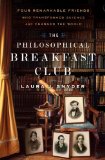Write your own review!
Jon V. (Marysville, PA)
(01/07/11)
Titans of Science
It would have been enough to devote this book to even one of the four scientists Snyder profiles. That she deftly weaves in and out of all four men's lives, highlighting their relationships, their philosophies, and their scientific contributions is remarkable. The science can become overwhelming at times, but for someone with a broad curiosity or an abiding interest in science, it's worth the read.
Mary G. (River Forest, IL)
(01/06/11)
Great Science But Connections Broke Down
It's an extremely well researched book about the four men who helped science establish standards for the science community in the 1800's. I had difficulty, however, with the author's time lines. She jumped around too often, leaving the human theme hanging, leaving the reader waiting for the story line to arc back and complete its original direction. Sometimes, she didn't make it back. Granted, chapter 12 does a great job of summing up the scientific matter. Even there, though, she made me wade through pages of science that had little to do with wrapping up the story of the four men who made it all possible, so I felt a bit let down. I admit that science isn't my particular bag and, in that case, I need a good story to push the boundaries of my horizons.
Dorothy M. (Maynard, MA)
(01/05/11)
From generalist amateurs to professional scientists
At the beginning of the 19th century, what we now think of as scientific pursuits were the purview of talented and often wealthy amateurs. Scientist was not a word, there was no money to support research, and the concept of a scientific method was unknown. Four visionary Cambridge students, Richard Jones, Charles Babbage, William Whewell and John Herschel were determined to change this and, amazingly through their work and their influence on the work of those who followed them, managed to do so. In telling their story, Laura J. Snyder also tells the story of the Victorian age - politically and socially as well as providing (often in excruciating detail) information on their varied work.
Because they were generalists rather than specialists, the subjects range from poetry to code breaking to astronomy to tide mapping to economic theory and more. William Whewell, as an example, is described as a “mathematician - mineralogist - architectural historian - linguist - classicist - physicist - geologist - historian - philosopher - theologian - mountainclimbing - poet”. In explaining the scope of the influence of these men, Snyder covers the work of pretty much everyone they knew - who, it appears, was everyone remotely involved in scientific research during their lifetime and beyond. This book will be a real historical treat for members of the scientific community and for those of us less familiar with the subject, it is an engaging primer.
Celia A. (Takoma Park, MD)
(01/04/11)
Slow read, but worth it
The writing style tended to be more academic than your typical popular book, so it was occasionally slow going. The author tends to go off on tangents that, although they come back around to her four protagonists, could probably be deleted without hurting the book. Despite these minor flaws, I enjoyed reading this book about a part of the history of science that I know very little. I'm glad that I pushed through to the end.
Jerry W. (Waxhaw, NC)
(01/04/11)
Scholarly But Accessible
This scholarly but very accessible history of science in the early nineteenth century centers on four young Cambridge undergraduates, William Whewell, Charles Babbage, John Herschel, and Richard Jones, who meet for breakfast on Sundays in 1812 to discuss their passion for "natural philosophy" (science) and their equally strong passion to reform how science is done.
I found the book an enjoyable read, at first. It was informative, fascinating, and not difficult reading. However, about a 1/3 way through the book I lost much interest. Maybe it was me and not the book. Anyway, check it out. I could be just the book for you.
 Carol T. (Ankeny, Iowa)
(01/04/11)
Philosophical Breakfast Club
Carol T. (Ankeny, Iowa)
(01/04/11)
Philosophical Breakfast Club
Every page reminds me of yet another person who would really enjoy this book. I may have to buy a peck of them for gifts this next year!! Historian, scientist, mathematician, economist, inquiring mind....there's something here to satisfy nearly everyone's interest.
 Diane S. (Batavia, IL)
(01/03/11)
the Philosophical Breakfast Club
Diane S. (Batavia, IL)
(01/03/11)
the Philosophical Breakfast Club
Absolutely fascinating book about the birth of modern day scientists. Four friends who changed and invented everything from standardized testing to prison reform. They touched on so many different subjects. I just wish I could have attended some of their meetings. Very readable book that even non scientific people such as myself could relate to. I especially like that their personal lives were covered as well as their professional, made these brilliant men more human.
 Vivian H. (Winchester, VA)
(01/02/11)
The Birth of Modern Science
Vivian H. (Winchester, VA)
(01/02/11)
The Birth of Modern Science
This book is for anyone who has an interest in 19th Century history - not just scientific developments. Four men of quite different backgrounds met at Cambridge and came to believe in the Baconian view that scientific discovery should benefit humankind, make the lives of ordinary people better. It was fascinating for me to read about the dawn of modern economics and how the political arguments of the time echo the same arguments we have today about social welfare. I wanted to read this book because I have an interest in John Herschel and his contribution to early photography and astronomy. But this story is so much more...about lifelong friendships, the industrial revolution, the pursuit of knowledge and scientific discovery through experimentation. This book is accessible for non scientists such as myself, is well written and gives amazing insights into the birth of modern science.







